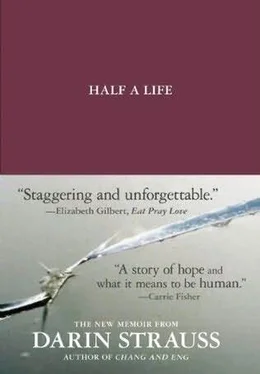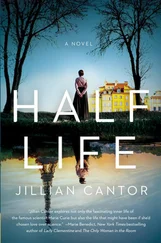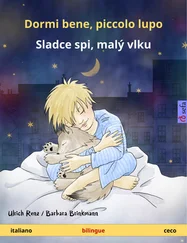A CONVERSATION WITH DARIN STRAUSS
Colum McCann is the author of the novels Let the Great World Spin, Zoli, Dancer, This Side of Brightness , and Songdogs , as well as two story collections. He won the National Book Award in 2009, has been a finalist for the International IMPAC Dublin Literary Award, and was the inaugural winner of the Ireland Fund of Monaco Literary Award. A contributor to The New Yorker, The New York Times Magazine, The Atlantic , and The Paris Review , he teaches in the Hunter College MFA Creative Writing program.
Colum McCann:They say all stories are the same. Of course this can’t be true. The poem doesn’t swerve and suddenly become a thriller. The playwright doesn’t necessarily know how to begin a rhyme. Can you discuss the challenges that face a novelist who switches to memoir?
Darin Strauss:My training and my inclination is to invent. Memoir was in some ways an easier form (you skip the hard, dreaming-stuff-up work) and in some ways more difficult (wait, you can’t just dream stuff up?). The novelist has permission to do whatever she chooses to supercharge whatever’s interesting in her story. This is also known as freedom. So, had this been a novel, I would’ve made the court case more steeply dramatic, for example. I couldn’t, of course.
But something about the exercise feels, for lack of a better word, pure. Trying only to remember what had happened — but exactly as it happened — and being reverent to the facts: trying to make something artful of that.
The challenge is being true and respectful and stylish, at once.
CM:Which it is. It all comes down to language, the holy word put in the right place. It seems to me that when a writer is working honestly the story finds the right language for itself. It’s somewhat mystical. Yet you have to work hard to create the possibility of this happening. And so it seems to me that it’s about stamina and desire, listening for the right music.
DS:Exactly: Babel’s famous, heart-piercing period. You mention the mystical. I shy from occult descriptions of what we do at the keyboard. But a sense does come — a frizzle that says each book teaches you how to write it. It’s different every time, and always requires a mix of inspiration and ass-in-the-chair time. Writing has somehow to involve both a slow patience and a thunderbolt.
CM:This book is full of thunderbolts — wonderful subtle strikes of weather. Everybody is going to want to know if you had ever considered fictionalizing it.
DS:Thanks. But I’d never considered writing it at all. I thought the accident was going to be my lifelong secret, the past I wouldn’t let poke into the now. I told almost nobody. Writing began only when we had our twins, when I realized the accident happened half my life ago: impending fatherhood tends to focus the mind. I felt with new force that I’d never be able to feel it all — never truly comprehend just how awful the Zilkes’ loss must have been. I wrote merely as a way to take hold of my thoughts about this. (I write to figure out how I feel and what I know about something; I imagine you’re the same way.) So the book started as a little therapy project, and has ended up with me talking to you here. Which still feels strange to me — the big secret as participatory event.
CM:Do you think the accident, or your knowledge of the accident, had influenced your fiction in other ways? In the word choice, in the movement of the characters on the page?
DS:Hmm. There is something numinous about writing, something beyond craftsman-y. (We don’t discuss this when we teach.) And so I’m wary even now of exploring it. Let’s leave a few of the seven veils in place.
CM:You write, “My accident was the deepest part of my life, and the second-deepest was hiding it.”
DS:I have a lot of friends who found out about my accident — the death, the lifelong guilt — only through the book, or the excerpts in GQ or on This American Life . So it was strange; people resented my silence. But I just really wasn’t ready to talk about it.
CM:Now you’re not only talking about it, but you’re making sense of it for others. You’re deepening its meaning but also its implications. How much do you consider it to be a project that you wrote for, say, your own children when they get a chance to read it? Does that idea frighten you?
DS:Colum, I don’t know how your work intersects your family life. For me, I simply can’t wonder how they (my kids, Susannah, my parents, any one particular reader) will respond. That would trip me up at the first word. I may have in mind a Platonic audience: me but smarter, free of prejudice, open, book lovers with a lot of time on their hands, Nabokov’s dictionary by their side, etc. And — though I never thought of it before — I guess I see this perfect reader as an adult. (My sons are now three.) All the same, I am anxious for my kids to read this. When do I show it to them? Will it be upsetting? These are the unknowns.
CM:Yes, but they’re also the beauties. My guess is that your children will thank you for it. They will say you are a better father for having muscled up to tell the truth.
DS:It’s kind of you to say. But my feeling is: I spent eighteen years shrinking from the truth. Sure, I finally knocked at the door of guilt with somewhat decisive knuckles. This strikes me, in itself, as not especially praiseworthy. I don’t mean to say it’s blameworthy. It’s neither one or the other — probably it’s midway along the cowardice-bravery continuum. Now, I am proud of how the book turned out; but I’ve gotten too much public credit just for the attempt. All the same, I do feel lucky that when I knocked, the door opened.
CM:How did your having written about it — this therapy project of yours — change the way you thought about the accident?
DS:You know, Mailer wrote The Armies of the Night as a response to an article in Time . He thought the reporter had misrepresented his (Mailer’s) behavior during an anti-Vietnam march. So Mailer begins his Armies by reprinting the entire Time article, and then there’s this: “Now we may leave Time to find out what happened.” The resultant book is a four-hundred-page letter to the editor.
I found myself with the same frustration, the same impulse, raised to a higher power. How crassly my local newspaper had portrayed the accident! As if the sadness quotient depended on Celine’s having been the most popular kid, the class pretty girl, some kind of prom superstar. I felt protective of the real her, who had been made 2-D by the reporter, simplified into something she wasn’t. In fact, maybe that’s where my fiction training came into play — knowing how to return nuance to the story, and chiaroscuro. At least, I hope it did. I left the pages of Newsday to write what really happened.
CM:Can you talk about the relation between the earlier works of fiction and this book? Similarities of voice, or perspective? Despite that this is a memoir and that those are novels, you wrote them all. They’re all Darin Strauss books. Can you find commonalities in them all?
DS:Saul Bellow once said he didn’t want ever to go to therapy, because he didn’t care to learn why he wrote what he did. Well, I’ve learned why I have. At the funeral home, Celine’s mother told me: “you are living … for two people.” My first book, Chang and Eng , was about conjoined twins — two men sharing one life. The first line is: “This is the end I have feared since we were a child.” The narrator’s both singular and plural—“we feared … I was.” Eng Bunker lived as two people and one person.
Читать дальше









